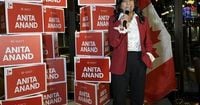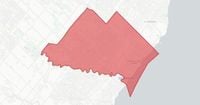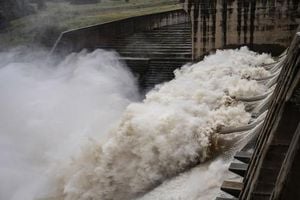In a decisive victory for the Liberal Party, Canadian Prime Minister Mark Carney is set to continue in office after the federal election held on April 28, 2025. The Liberals managed to fend off challenges from the Conservative Party, led by Pierre Poilievre, who conceded defeat, stating that his party would hold the minority government accountable. This election has significant implications, particularly for the Indian-Canadian community, which saw over 65 candidates of Indian origin contesting for seats in the House of Commons.
Among the notable figures in this election was Jagmeet Singh, the leader of the New Democratic Party (NDP), who stepped down after losing his own seat in Burnaby Central. Singh received approximately 18.1 percent of the vote, while Liberal candidate Wade Chang won with 42.1 percent. Conservative candidate James Yan trailed closely with 38.7 percent. Singh congratulated Carney, expressing confidence that he would represent all Canadians and safeguard the country from external threats, particularly from U.S. President Donald Trump. "It's been the honour of my life to lead the NDP, and to represent the people of Burnaby Central," Singh tweeted after the results were announced.
In Edmonton Southeast, Liberal candidate Amarjeet Sohi faced a tough challenge, losing to Conservative Jagsharan Singh Mahal, who garnered 53.6 percent of the vote compared to Sohi's 38.3 percent. Sohi, who had been serving as Edmonton's mayor, accepted the outcome gracefully, stating, "Yes, this is not the result we expected, but this is the result we accept." Sohi was born in a village near Punjab's Sangrur and has been a significant figure in local politics.
Meanwhile, Anita Anand, the Liberal candidate for Oakville East, celebrated a successful re-election campaign, securing 50.7 percent of the votes. Anand defeated Conservative candidate Ron Chhinzer, who received 45.1 percent. As the current Minister of Innovation, Science, and Industry, Anand emphasized her commitment to strengthening Canada's economy and supporting vulnerable populations. "We will always stand strong for Canadian sovereignty," she declared at her victory party, where she addressed over 200 supporters. Anand, who has held multiple cabinet positions since her initial election in 2019, promised to focus on economic stability, community safety, and healthcare for seniors during her new term.
In Surrey Newton, Liberal candidate Sukh Dhaliwal was leading with 49.2 percent of the vote, ahead of Conservative Harjit Singh Gill, who had 44.1 percent. Dhaliwal has been a Member of Parliament since 2015 and serves as the Chair of the Standing Committee on Citizenship and Immigration.
On the other hand, the People's Party of Canada candidate Jayesh Brahmbhatt was defeated in the Brampton-Chinguacousy Park constituency by Liberal Shafqat Ali, who secured 48.7 percent of the vote. Brahmbhatt, who has a background in civil engineering, remarked on the increasing visibility of the Indian community in politics, stating, "Parties are now identifying Indians as an important community in politics, and sub-groups such as Gujaratis are making the most of this opportunity to be represented and be heard."
In the Brampton West constituency, Liberal Kamal Khera lost to Conservative Amarjeet Gill, who received 50 percent of the votes compared to Khera's 47.5 percent. Khera, one of the youngest women ever elected to Canada’s parliament, has been an MP since 2015 and currently serves as the Minister of Health.
In Calgary Heritage, Conservative Shuv Majumdar achieved a significant victory over Liberal candidate Scott Arnott, winning 61.7 percent of the vote. Majumdar, who has a background in foreign policy and national security, emphasized the importance of the election, stating, "This election is about defining the future of our nation - for generations."
However, not all candidates fared well. In Calgary East, Liberal candidate Priti Obhrai Martin lost to Conservative Jasraj Hallan, who received 60.6 percent of the vote. Obhrai Martin, the daughter of the late Deepak Obhrai, who was the first Hindu elected to the House of Commons, expressed her pride in her father's legacy during her campaign.
As the election results continue to unfold, the Liberals have secured 158 races, leading in ten others, with a popular vote share of 43.53 percent. The Conservatives have 142 races called in their favor, with a 41.39 percent share. This election marks a critical moment for the Canadian political landscape, particularly for the representation of diverse communities.
With the NDP expected to hold fewer than ten seats, the party faces a significant challenge moving forward. Singh's departure as leader raises questions about the future direction of the party and its ability to connect with voters. As the dust settles from this election, the focus will shift to how the Liberal government, under Carney, will address pressing issues such as healthcare, economy, and national security, while also ensuring representation for all Canadians.
In summary, this election not only reaffirms the Liberal Party's hold on power but also highlights the growing influence of the Indian-Canadian community in shaping Canada's political narrative. The new government will need to navigate these dynamics carefully to maintain support and address the diverse needs of its constituents.





